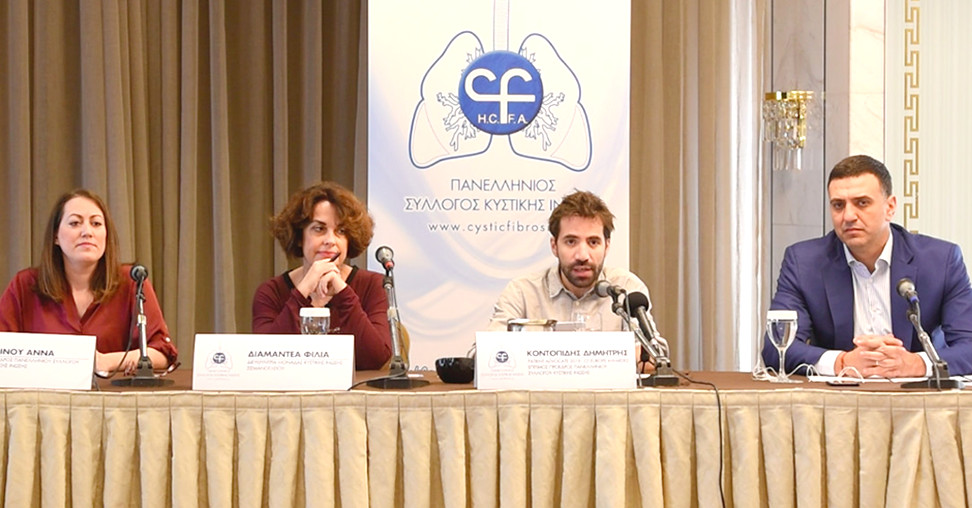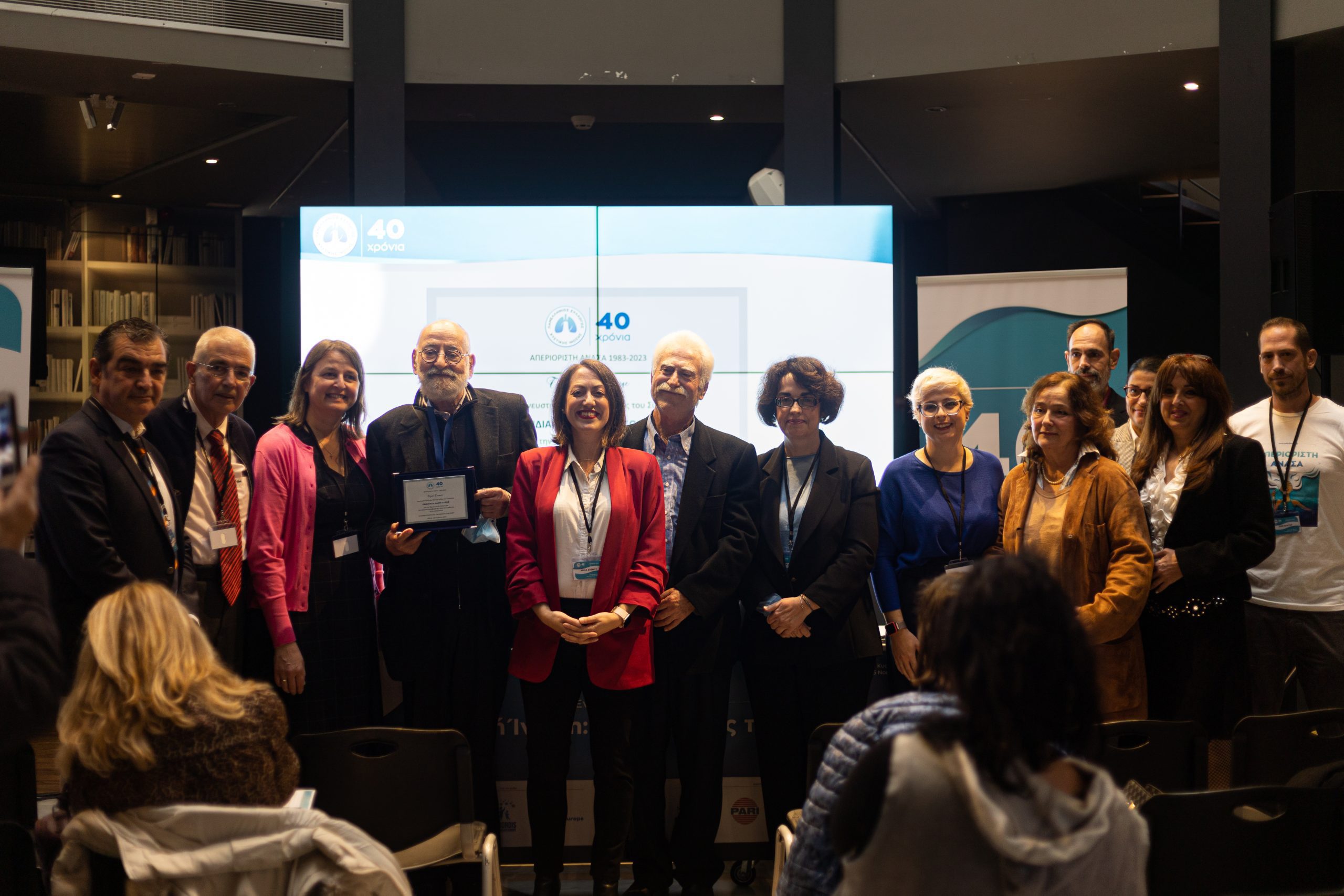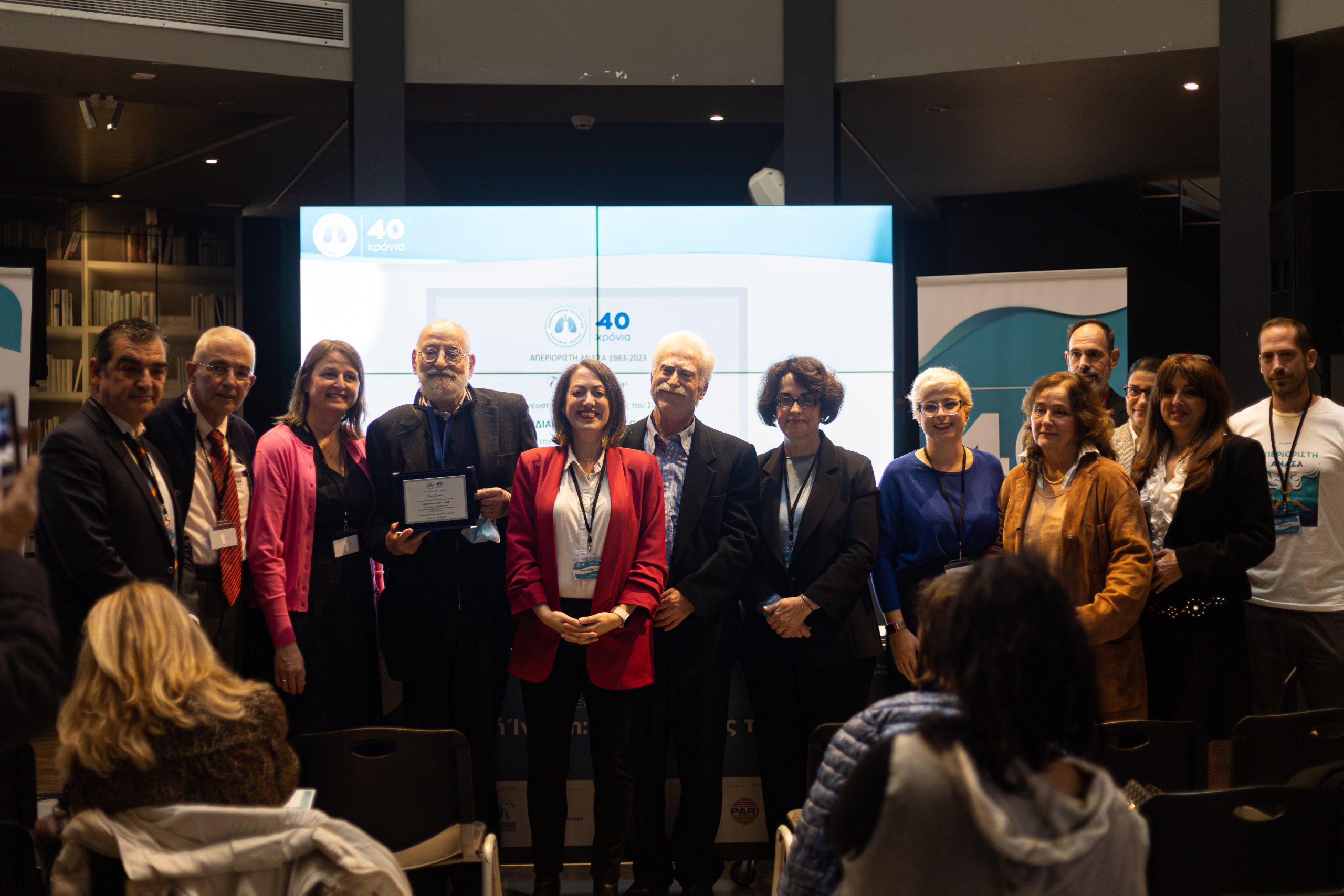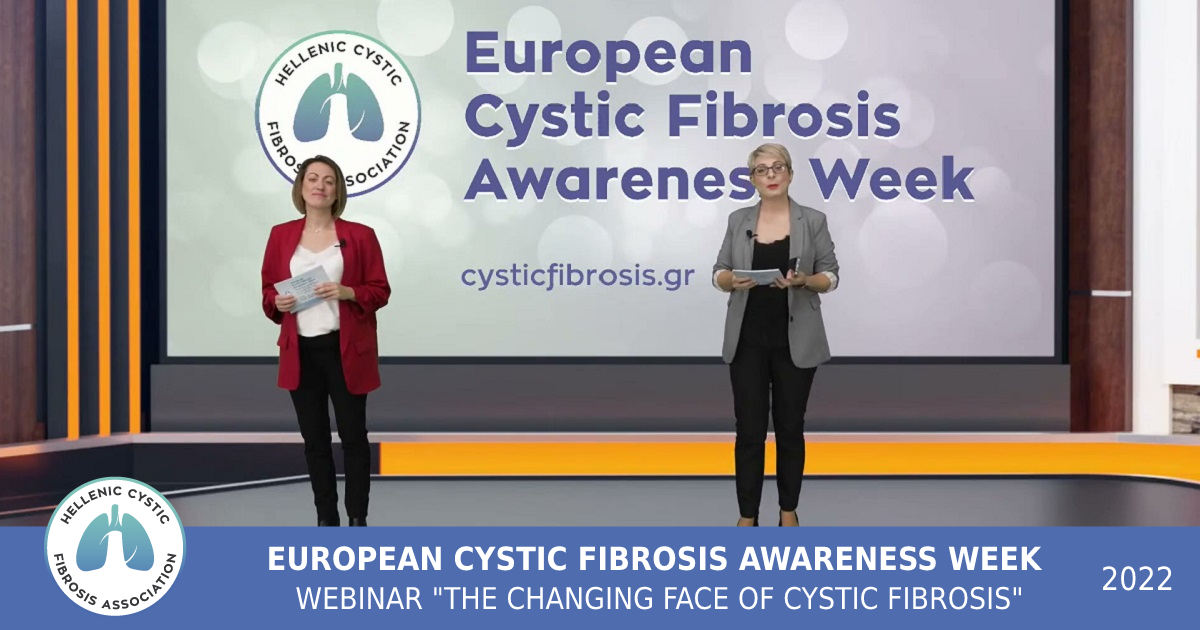The Health Minister committed to immediate access to the innovative drug “Trikafta” that “freezes” the disease by inviting the pharmaceutical company to negotiate. Patients in respiratory failure (<40% respiratory function), are entitled to immediate access through early access, and under the current legal framework, prescriptions have been initiated through IFET. We do not accept to lose even one patient as the issue is a matter of immediate decisions and not bureaucracy. We therefore call on society to support us in a matter of life and death, where every day is critical.
The Minister’s commitment to recruit pulmonologists specifically for the Adult Cystic Fibrosis Units at Sismanoglio and Papanikolaou in Thessaloniki through the resulting 2500 permanent staff recruitment is the second priority that we have agreed and expect to implement.
Finally, the critical situation for patients awaiting lung transplantation is a huge issue that needs immediate intervention. When we had managed to save 5 patients a year through Austria, it is tragic to return to the despair of not being able to transplant.
Press conference
European Cystic Fibrosis Awareness Week
“We are celebrating European Cystic Fibrosis Week and this year we have set 3 priorities/challenges to address: a) immediate access to innovative treatments targeting the causes of the disease (CFTR correctors) such as the new combination ”Trikafta”, b) lung transplants and c) staffing of Adult Cystic Fibrosis Units. These priorities have been put to the Minister of Health since the summer and we are in constant contact. With regard to access to innovative treatments, we are in constant contact with the pharmaceutical company, and we have had a meeting with the Vice President of the EOPYY, Mrs. Karpodini, and tomorrow we will inform the President of the EOF, Mr. Philippou.
Today we are here to start gradually implementing concrete steps with public commitments and timetables.”
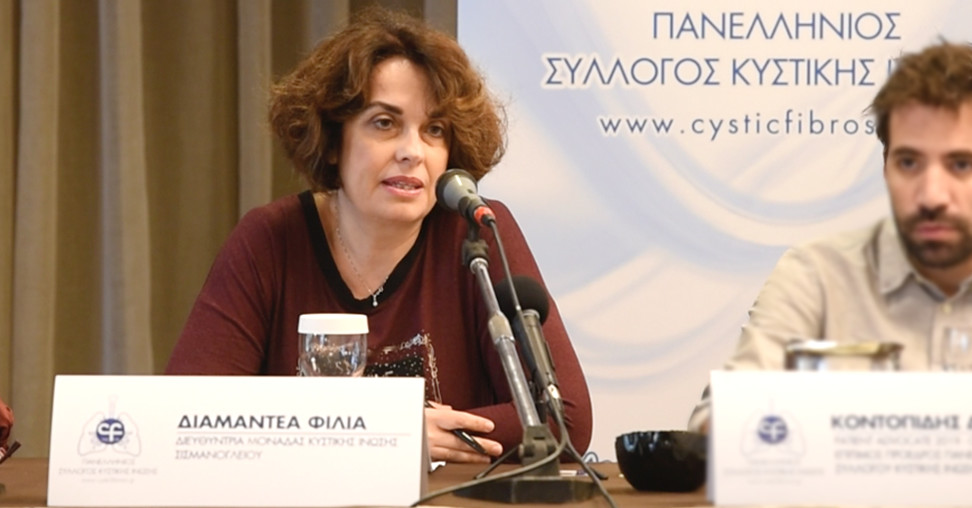

1) Strengthening of Adult C.F. Units
Friendship Diamantea
Pulmonologist – Director of the Cystic Fibrosis Unit
Sismanoglio Hospital
Cystic fibrosis is the second most common hereditary disease in our country after Mediterranean anemia. The incidence is 1:2500 – 3000 births. 4 -5% of the general population in our country are carriers of the disease, i.e. there are about 500,000 carriers in Greece and about 40 – 50 new births/year are expected.
PRESENT SITUATION
Patient survival has increased significantly over the last 30 years. Median survival 15 years in 1989, now 40 years in advanced countries with well-organised and subsidised health systems. The benefit of the new treatments available after 2012 has not yet been factored into the increase in survival. Children born after 2010 may have normal survival.
Cystic fibrosis is a disease with many specificities, fatal at an early age, requiring specialised knowledge and experience in its management. In recent years, significant advances in early diagnosis and management of the disease have contributed to a significant increase in patient survival, with 50% of patients worldwide now being adults (as opposed to, for example, in the 1980s when only 30% reached adulthood). The consequence of this is the rapid and large increase in the number of patients attending adult centres worldwide. It is estimated that by 2025 the number of patients in adult centres will increase by 70%, at least in advanced countries. In addition to the large increase in the number of patients, there is also a very large increase in their needs, due to the frequent monitoring that patients require and the multiple problems and complications that they experience. New treatments that are expected to change the course of the disease place an additional burden on adult centres, due to the time-consuming process of prescribing the drugs and the need to monitor the patients who receive them.
This creates a huge pressure to strengthen and adequately staff the adult CF units in our country in order to meet the needs of patients. In our country there is the Adult Cystic Fibrosis Unit at Sismanoglio and the Cystic Fibrosis Centre of the Aristotle University of Thessaloniki at the Papanikolaou Hospital in Thessaloniki.
The Cystic Fibrosis Unit (CF) for adults at Sismanoglio has been operating since 1997 and is recognized by the Cystic Fibrosis Center of Thessaloniki by the decision no. 7 of the 189th /15-01-2004 Plenary Session. It is the largest centre for the treatment and monitoring of adult CF patients in Greece. In the Adult Unit of Sismanoglio, 280 patients are currently being monitored, and their number is constantly increasing due to the continuous integration of new patients from the corresponding Unit of the Children’s Hospital “Agia Sophia”, other centres of the province and adult patients with late diagnosis of CF. This has resulted in the addition of about 20-30 new patients per year to the Unit of Sismanoglio. In addition, at the present stage, 40 transplanted Cystic Fibrosis patients are referred to the Sismanoglio Unit for their medical or procedural problems. It should be pointed out that the department receives CF emergencies 24 hours a day and at the moment most of the on-call cases are covered by only 1 physician, who covers the CF department and the B-Pulmonology department in addition to the CF department. The department employs 3 specialist pulmonologists, 2 permanent and 1 auxiliary doctor with an annual contract ending in a few months.
The Adult Cystic Fibrosis Centre of the Aristotle University of Thessaloniki at the Papanikolaou Hospital in Thessaloniki, operates within the framework of the Pulmonology and Physiology Clinic of the Aristotle University of Thessaloniki and currently 57 adult CF patients from all over Northern Greece, from Evros to Epirus, are being treated there. The number of patients at the centre is increasing significantly every year as a total of 13 new patients have arrived since the beginning of 2018. At the same time, more than 30 adult patients continue to be monitored in the paediatric Cystic Fibrosis departments of Papageorgiou and Hippokratheion in Thessaloniki, who cannot go to Papanikolaou for monitoring due to lack of space and staff. The permanent medical staff of the Centre consists of 2 pulmonologists, faculty members, one of whom has recently taken over the responsibility of another department and is also due to retire in the next 2 years.This department is unable to continue to attend all the adult patients of B. It is impossible for this department to continue to cover all the adult patients of Northern Greece, while its non-smooth operation will continue to accumulate more and more cases in the Unit of Sismanoglio with all that this entails in terms of suffering and lack of appropriate care for the patients of Northern Greece and the rest of Greece.
We are faced with a unique phenomenon for the NHS, adult units that are being ‘hydrocephalized’ and already their needs exceed ours.
In this context we are calling for the initiation of the:
– advertisement of 2 permanent B ́ NHS Attendants for the CF unit in Sismanoglio
– renewal of the term of office of the Assistant Doctor of the CF Unit in the Simanoglio CF Unit as she already has experience in Cystic Fibrosis
– announcement of a permanent position of a permanent Assistant B’ NHS Attending Physician in one of the vacant organic positions of a Pulmonologist at the Papanikolaou Hospital, with a special placement in the Respiratory Infections Unit and the Adult Cystic Fibrosis Center of the Pulmonology Clinic of the Aristotle University of Thessaloniki.
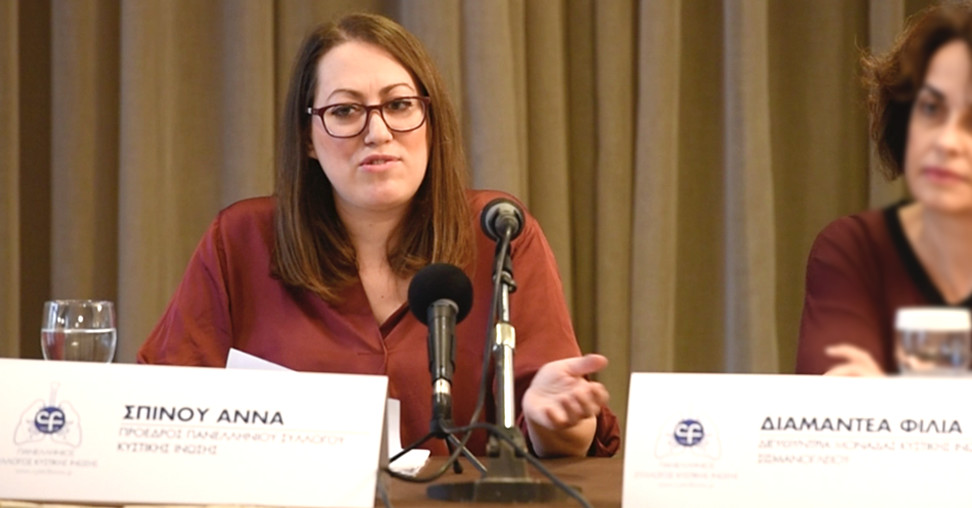

2) Lung transplants
Anna Spinou
President of the Board of Directors of the Hellenic Cystic Fibrosis Association
When a CF patient reaches the final stages of respiratory failure the only survival option is lung transplantation.
So in 2014, as an Association, we took the lead in our country’s transnational agreement with Austria for a lung transplant programme for our Greek patients at the transplant centre in Vienna. We have therefore managed to transplant 5 patients per month. every year, while in 2017 we managed to transplant 7 of our patients.
This year in May, coincidentally, on the day I went to do my exams in Sismanoglio for the doctor to send my exams to Vienna for pre-transplantation testing, we were suddenly informed by the Vienna transplant center that the cooperation with Greece was discontinued.
After this abrupt interruption from May onwards we are practically in the air. We are at least 5 CF patients who need immediate pre-transplant evaluation for inclusion in the list out of a total of 15 patients.
But the list needs to have transplants in order to be impactful. Unfortunately, lung transplants are one of the “hardest to find and most delicate organs”. And unfortunately, Greece ranks last in organ donation.
At the moment, although there is a trained team of doctors who returned from Austria and are ready for the first surgery with the support of the Vienna team, there are no transplants and there are shortcomings in the organization of pre-transplant and especially post-transplant follow-up.
If we do not immediately target the causes of the problem starting in the Intensive Care Units (ICUs) and the staffing of the National Transplantation Organisation we risk losing our patients. When we had managed to save 5 patients a year, it is tragic to return to the despair of not being able to transplant.
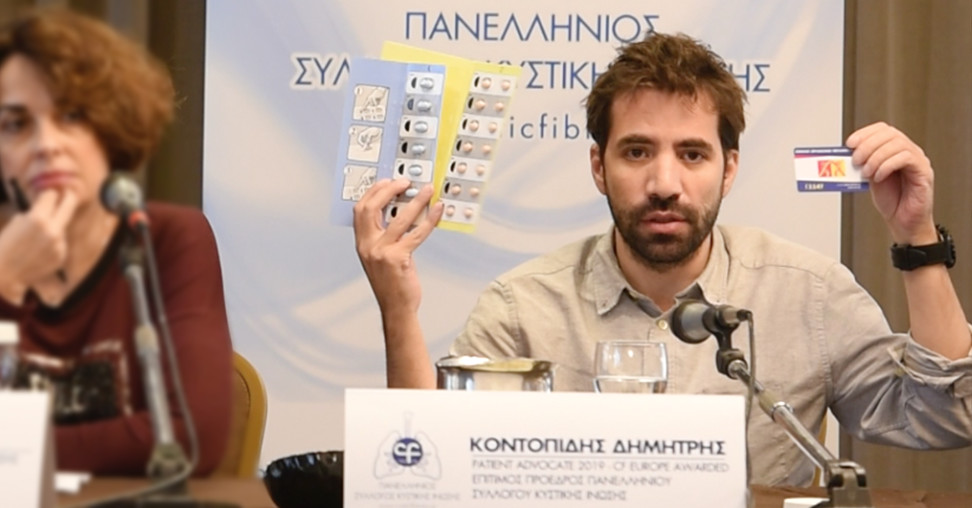

3) Access to the new Trikafta combination
Dimitris Kontopidis
Honorary President of the Hellenic Cystic Fibrosis Association
Awarded Patient Advocate 2019 by CF Europe
Member of the Board of the Hellenic Patients Association
Innovative Drug that ”freezes the disease”.
The day we have been waiting for since the moment we were born has arrived!
Last month on October 21, the revolutionary treatment that ”freezes” the disease was approved by the FDA ( American Food and Drug Administration ) and has already been submitted for approval to the European Medicines Agency (EMA). It is the new innovative combination elexacaftor / ivacaftor / tezacaftor branded (Trikafta™) for people with cystic fibrosis aged 12 years and older who have at least one F508del mutation. It is extremely important for 2 reasons. a) it affects more than 90% of patients worldwide and b) it has impressive results. It is typical that in our Greek plus patient it increased from 50% to 75% his respiratory function, pseudomonas (the persistent microbe that patients are colonized with and destroys mainly the lung) disappeared, he has no sputum, he increased his body weight – the manifestation of the disease practically disappeared. It affects each patient differently and it goes without saying that the sooner we take it, the faster the progression of the disease will stop.
But the important thing is to get it into the patient’s hands, i.e. his compensation.
In Greece because of the different mutations we believe that it will affect about 75% of patients who are heterozygotes while gradually it will be extended to homozygotes who take the previous Orkambi combination of the same company.
What we are asking for:
– Based on the current legal framework in Greece we can immediately and have already started prescriptions for patients in respiratory failure the introduction of the new 3-plus combination through individual prescriptions to the IFET. We therefore ask the EOF and the EOPYY to proceed with the approvals of these prescriptions without delays since these patients are a high risk group. A simple infection is enough to lose them.
– At the same time, we are asking the Minister to invite the pharmaceutical company, on the initiative of the Minister, to start the procedures for importation through the EOPYY and price negotiation for both the new combination and the old ones already reimbursed through the EFET. These are closed budgets where they can be secured through a patient registry under the responsibility of the EOPYY as has been done with other conditions (Hepatitis, etc.) We have already met with the Vice President Ms. Karpodini and informed about it, but also EOF.
– Finally, the most important thing is this: Because these procedures will take time, patients should not be put at risk under any circumstances. We therefore request that the early access early access procedure be activated in which patients with respiratory function <40%, which is the risk group, will be directly supplied with the drug. We will be present in all these procedures and will follow the developments as we refuse to lose even one patient.
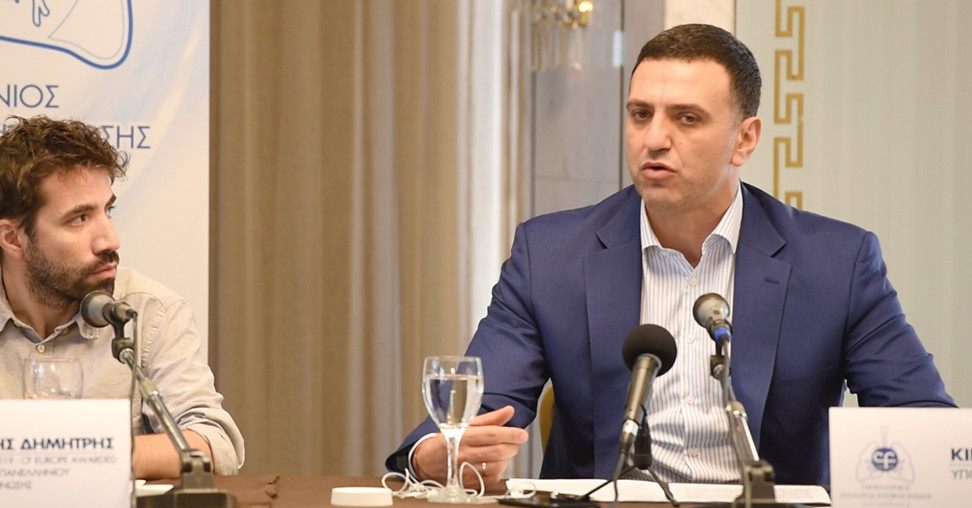

4) Vassilis Kikilias, Minister of Health
“I listened with great interest to the speakers who preceded me. In the person of Dimitris Kontopidis there is for all patients the respect and appreciation for their robust personality and the soul they show. From the first moment we met, we set a plan for how we as an organized state can really help and not in words.
I have already instructed the EOPYY and the EOF to take the appropriate actions to have the Trikafta drug with an early access program. The company is invited to come forward. It is already being done in other countries. There will be a negotiation, anyway, at the EOPPY for the price of the drug. But for those patients who are at risk, administer the drug after the company’s request to the EOF, because that’s the law.
The EOPPY is ready to negotiate the price, as provided for. Research and technology is ongoing and there is a much greater possibility of shielding the health of cystic fibrosis patients through this drug.
It is a rare genetic condition, an evolving disease. We are committed to supporting these people. The steps in terms of what’s involved with this particular medication are these and we will be monitoring them closely.
There are two other issues that are important. I wish that the only problem was that of understaffing or poor organisation of the NHS.
Please very much get in touch with the Secretary General of the Department, Mr Kotsiopoulos. I have already instructed, as part of the 2,500 permanent staff recruitments that will be made, to include the clinics that deal with cystic fibrosis patients, based on the needs and a comprehensive study of a health map for the whole country, which has to do with which clinics are understaffed, what their occupancy rate is, how long they keep patients, what their efficiency is and what their cost-effectiveness is for the patient.
We are interested first and foremost in vulnerable groups. We have proven that with oncology patients. We have proven it with patients who need blood derivatives, gamma globulin, and where there is a need, the Ministry of Health will run to meet it.
That is our priority. Of course, the NHS workers deserve a thumbs up and a thank you, who for many many years have struggled in very difficult circumstances, with restrictive fiscal policies, and kept it standing.
Another important part is that of transplants. I am sorry that we have inherited this situation. With the way we have operated in recent years in terms of transplants, the organised state cannot be happy.
We are therefore, obliged to upgrade the EOM and give new opportunities to top surgeons, who are available in the country and can take up this burden.
Obviously we want to transfer the techniques, the expertise, the science from abroad.
But there are surgeons in our country in leading hospitals and university clinics who perform transplants. We need to organise them, to set up a framework, to support this effort.
We must also make it clear to Greek society that this is a life-giving gesture for our fellow human beings, that this is a sacred decision and that it must be taken.
In the past there has been an awareness of the issue of transplants. However, in order to avoid patches in health care, things must be organised, institutionalised, with an institutional framework, a specific strategy, a tactic that implements it and communication on it.
To summarise: short-term objectives, medium-term objectives, long-term objectives.
First of all, medicine. Commitment from the Ministry of Health both to the EOF and to the EOPYY and a strong push for the company to come to the EOF, to go through these procedures in order to have early access.
Negotiate with the company on everything to do with the price of the drug. Obviously this has to do with a closed group. These are known individuals who can and do take the previous drugs and will take this one.
In the second year, organization of how here and in Northern Greece the corresponding departments and clinics of the clinics can be staffed and supported, organized and based on the possibilities that they have.
And thirdly and most importantly, along with all this, transplants are a very important part – and not only for patients with cystic fibrosis. There is enormous anguish for them and their families, and the public needs to be made aware, people need to know how important it is and support it.
And on the part of the State, the obligation is for institutional framework, organisation, strategy and communication. The more people become aware, the more people realize how important this gift of life is, I think the more people will respond.
Thank you very much for today’s invitation.”

